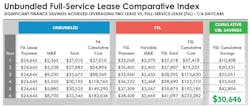Fleet Advantage offers unbundled lease comparative index
ORLANDO, Florida—A data-driven approach can help fleets make better decisions about their complicated futures. Fleet financing and management provider Fleet Advantage is showing off its newest carrier data resource here at NPTC 2024 to help fleets compare leasing options costs.
Fleet Advantage’s new Unbundled Full-Service Lease Comparative Index calculates whether unbundling suits private fleets' operations.
“We’ve unbundled close to 3,500 trucks over 24 months with some of our largest customers,” Brian Antonellis, Fleet Advantage SVP of fleet operations, told FleetOwner during the National Private Truck Council’s conference here.
He said flexibility and competitive finance options are the most effective ways to reduce truck and finance costs. For example, the new index could show that a daycab tractor operating 30,000 miles per year with an unbundled finance lease with maintenance can save $50,646 compared to a full-service lease. While it depends on details such as OEM, application, utilization, and more, Antonellis said fleets are likely to see savings compared to full-service leases.
Many fleets today are in full-service leases because of the included maintenance program. Through its new partnership with FleetNet America by Cox Automotive, Fleet Advantage facilitates fleet maintenance service offerings to private fleets that want flexible, unbundled lease structures.
Antonellis said that the unbundled, flexible leases also help fleets overcome the mindset that equipment should last a set time period. “You need to have an option to early-exchange the truck if it’s run a higher mileage, so you’re matching your warranty and your maintenance strategy,” he explained. “Or you can extend your truck if you’ve run lower miles, so you can still get the value out of that truck at a lower cost.”
He said these strategies can help fleets prepare for upcoming emissions regulations expected to increase 2027 prebuy strategies in advance of U.S. Environmental Protection Agency and California-specific regulations.
About the Author
Josh Fisher
Editor-in-Chief
Editor-in-Chief Josh Fisher has been with FleetOwner since 2017. He covers everything from modern fleet management to operational efficiency, artificial intelligence, autonomous trucking, alternative fuels and powertrains, regulations, and emerging transportation technology. Based in Maryland, he writes the Lane Shift Ahead column about the changing North American transportation landscape.


